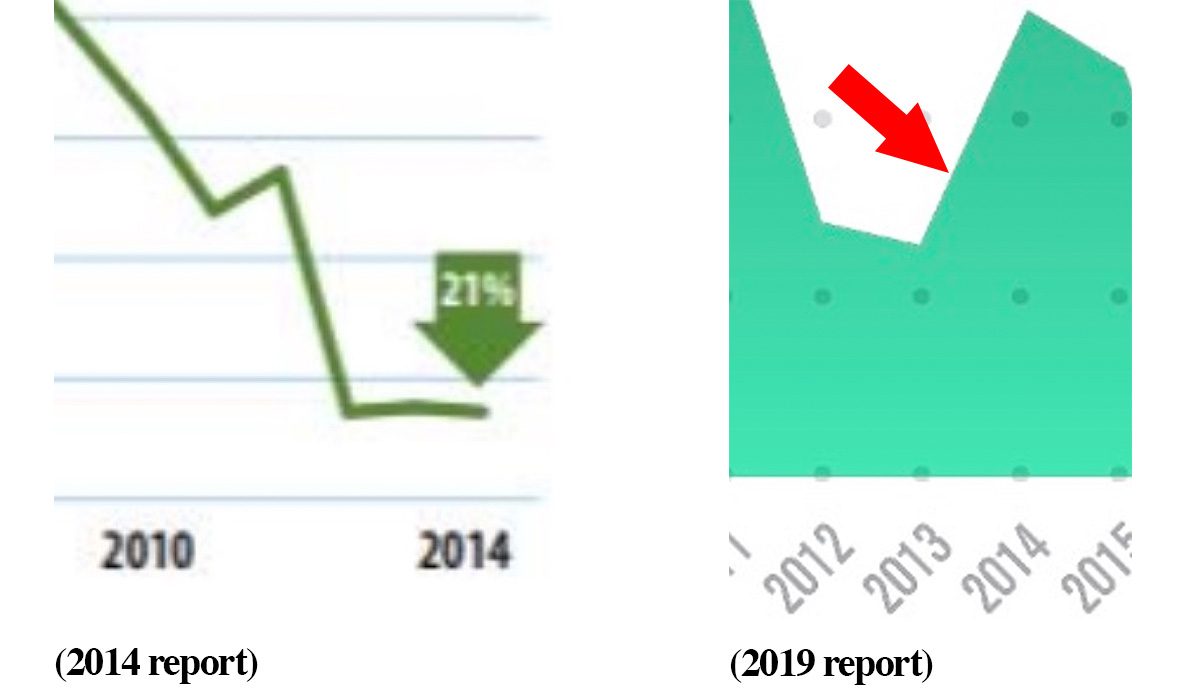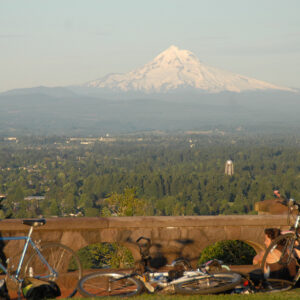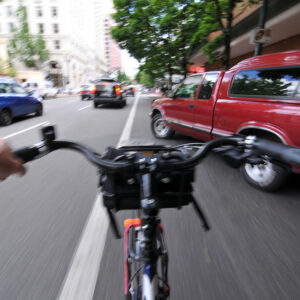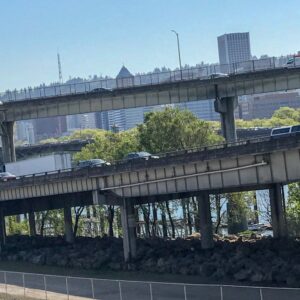
Yesterday Portland released an update on local carbon emissions. The results are troubling. With demonstrations planned tomorrow as part of the Global Climate Strike, I anticipate City Hall will put out a statement supporting the event and use the occasion to reaffirm Portland’s “commitment to climate change”.
But just how committed are we? I’d say not very if you look at how little priority we’ve given to tracking our progress thus far.
In 1993, Portland was the first city in the US to create a climate action plan, yet we still don’t consistently report our results. This lack of basic accounting allows government agencies to control the progress narrative and doesn’t allow for the honest reckoning this issue demands.
This lapse in basic accountability begs us to ask whether the city’s Bureau of Planning & Sustainability (BPS, who compiles the report) or the Mayor who oversees them, is either not competent enough to monitor the biggest crisis of our generation, is trying to spin the truth, or simply doesn’t care enough to prioritize it.
Out of 171 action items currently tracked by the 2015 Climate Action Plan, publishing an annual report is the second to last. The report published yesterday (PDF), which didn’t include updates on any of those 171 actions, comes two-and-a-half years after the last report. There was no mention of the delay. In fact, the report plainly states that Portland monitors and reports data annually.
This past July, when Portland Mayor Ted Wheeler testified in Washington D.C. before the Democrat’s Special Committee on the Climate Crisis, the report was officially seventeen months late. This lapse in basic accountability begs us to ask whether the city’s Bureau of Planning & Sustainability (BPS, who compiles the report) or the Mayor who oversees them, is either not competent enough to monitor the biggest crisis of our generation, is trying to spin the truth, or simply doesn’t care enough to prioritize it.
Why does consistent and up-to-date progress tracking matter?

The 2017 report showed a steep decline in Portland’s total emissions, 21% down from 1990 levels in 2014. 2014 was the year of the infamous Ice Bucket Challenge; before the Columbia River Gorge caught fire and before the IPCC Report was released. It was also the last year that Oregon’s emissions declined, thanks to a still rising increase in transportation emissions.
Advertisement
Newer data, reported by BPS this summer and published yesterday, showed that 2014 was in fact not down but up, both per person and in total, reversing several years of decline. There is still no mention of this dramatic shift, one that rightly would have changed our narratives around our progress on climate action the last several years. We are still left to wonder whether this change is because of new accounting methods, or a more troubling inconsistency with the 2014 data, as it was the only year that seemed to change.
The bureau claimed via Twitter that “This is very good.” But to me the last five years look like the flattening out at the bottom of a ski slope, sputtering to a stop.
How we communicate when we fail to meet our goals and how quickly we can course correct will define our success — or failure.
If Portland had continued its steady decline as it had from 2000 to 2013 we would have reduced emissions by roughly 30% by 2017, doubly as far along as the 15% plateau we’re on now. Every year we stay at this level puts us in greater jeopardy that we won’t be able to meet the 40% reduction goal by 2030.
With an aim to get us there, one of the demands of the local chapter of the Sunrise Movement, a spirited new organization that has made their presence felt at meetings for Metro’s 2020 Transportation Bond and staged a sit-in at Mayor Wheeler’s office, is to declare a climate emergency. It seems we’re finally getting around to that. Making declarations is one of the things we do best.
We made another declaration in June 2017 when Portland and Multnomah County passed a resolution to convert all energy, including transportation, to renewables by 2050. The Oregonian reported the hearing as “…largely a congratulatory session, with plenty of tweaks to the language, but little dissension or discussion of the technical challenges ahead.”
I personally found the resolution so lacking in teeth that it was the first time I used a vacation day to testify at city hall.
From the perspective of our elected leaders, it’s easy to see why they felt so confident. Just a few months earlier (in April), Portland was reportedly on track to meet its emissions reductions goals. Except, it wasn’t true then. And it’s not true now.
To tell the truth about the state of affairs means admitting that we’re failing to meet our goals. It is to say that our current systems of politics and power have not shown themselves to be capable of managing this crisis. There is no sugar-coating it, plunging our emissions downward will require vigilant and aggressive action. It will be hard.
How we communicate when we fail to meet our goals and how quickly we can course correct will define our success — or failure — over the next decade.
In 1993 Portland was leading the way on climate action. Now we’re are at a turning point and at risk of becoming an example of what not to do. It’s time to stop the back-patting and speak honestly about the scale of the task at hand. If we can get control of emissions and turn these lines in the right direction, Portland could once again be a model for cities worldwide.
— Catie Gould, @Citizen_Cate on Twitter
Never miss a story. Sign-up for the daily BP Headlines email.
BikePortland needs your support.







Thanks for reading.
BikePortland has served this community with independent community journalism since 2005. We rely on subscriptions from readers like you to survive. Your financial support is vital in keeping this valuable resource alive and well.
Please subscribe today to strengthen and expand our work.
The real problem is that the time for studies, gradual action, long term plans for transportation and infrastructure improvements was back in the late 1970’s ( yes we did know then). But now are emissions are so high, and we are so close to several geo-climatic tipping points that only very very drastic changes to the emissions profile in the developed world will make any real difference. We can no longer hope to prop up the post WWII American lifestyle with renewable hopium. E-Scooters, E-bikes, and E-cars powered by wind farms won’t do it because the emissions created by building out a large enough infrastructure of these things will push us over the brink. We blew it, we tried to make a bargain with the devil to keep our enormous fossil fuel lifestyle intact and now it is time to pay the piper. We now have two real choices. One is to do nothing or continue down the route of meager change like we have been and let mother nature do the pruning for us ( and take down the planet as we know it) or make massive immediate changes that mostly involve conservation, downscaling, localization and simplification and do it on a timetable that would make the mobilization at the beginning of World War II look slow. Sorry, there is not a happy middle ground where we get to keep flying to Disney World, eating grapes from Chile and driving the SUV to work ( or anywhere) and still have a planet for our children that remotely resembles the one live on now.
You apparently believe in the science when it comes to acknowledging a climate crisis but reject the scientific consensus when it comes to probable outcomes and mitigation/adaptation pathways.
Even if we miss 3.7 °F, 7.4 °F is much worse. Our moral obligation to fight the climate crisis only increases every time we miss a goal. The idea that the world will end when we miss climate crisis goals is the worst kind of nihilistic luddism.
Awesome, both the swear words of techno-utopiananism ( nihilistic and luddism, used in the same sentence. Lets unpack these one at a time. One is nihilistic if one believes there is no hope and you should just throw in the towel and wallow in self pity or debauchery. I am suggesting that we roll up our sleeves and take extreme positive actions that have a proven chance of reducing climate change, by looking at those things that are dependent on gobbling fossil fuel energy, or need large quantities of fossil fuel energy to be created and phase them out quickly.
Phasing out suburbia, personal automobiles, air travel for the masses , air freighted fruit and most air conditioning is not luddism it is realism. Those who think we can power such things with windmills and solar cells are delusional, or don’t understand thermodynamics. We should still pursue renewable energy vigorously ,because in the long run it is all we have. But we have to understand that most of what we think of as our technological birthright is just the booty from burning up 200 million years of stored sunlight in a little over 100 years. A world powered by the sun looks completely different than the world we live in now, and the sooner we recognize that, and make drastic changes the less likely it will be that we have to go to eating jellyfish for food or moving Washington DC to West Virginia ( if that is what you mean by adaptation).
We all, all of us, have a set of basic human rights, but also a set of complex responsibilities that go with those rights. For example (feel free to add additions):
– We have a basic right to be born and to (eventually) die. But we also have a basic responsibility to do our best to make the world a better place for the time in between.
– We have a right to procreate, but we also have a responsibility to not get carried away.
– We have a right to breath and drink clean water, but we have a responsibility to make sure that the air and water remains clean.
– We have a right to vote and engage in our governance, including electing clowns to high office, but we have a responsibility to actively participate in government, to advocate, to vote, and to elect reasonable people to positions of power.
– We have a basic right to travel, to move from one place to another, to meet people and explore our world, but we have a responsibility to use the most efficient and least impactful methods to do so; a diesel bus and commercial jet are both high-polluting, but they sure beat a personal driver-only car or a business jet.
We have birthrights, but we also have responsibilities. We need to work on our responsibilities.
I also desire extreme action as described by the IPCC 5th AR and the 1.5 C SR..
If you bothered to move beyond your own opinion you would find that “mostly … conservation, downscaling, localization and simplification” is not enough. This kind of oversimplification diminished the magnitude of this crisis.
The intro to the SR15 gives you an outline for the reading you really should do if you care about this crisis:
https://www.ipcc.ch/site/assets/uploads/sites/2/2019/02/SR15_Chapter2_Low_Res.pdf
PS: I’m fiercely pro-conservation because this is the lowest hanging fruit when it comes to the climate crisis. An aggressive conservation program could cut our energy use by 50-60% in a very short period. But this is still NOT ENOUGH!
“Phasing out suburbia, personal automobiles, air travel for the masses , air freighted fruit and most air conditioning is not luddism it is realism.”
What gives you the idea that I disagree with most of these “reforms”?
In fact, some do not go far enough. For example, I believe we should phase out most low-density urban areas (e.g. large swathes of Portland). Similarly, I also believe we must largely eliminate our consumption of animal products as a *basic staple*.
As for air conditioning, I do believe AC should be made efficient and carbon neutral. I also believe that we can dramatically reduce our global need for AC via building design. However, much of our global population lives in the tropics and suggesting that they should forgo AC in the face of ever increasing heatwaves is heartless and disturbing.
jellyfish doesn’t taste very good (or much at all), but the texture is kind of nice.
The planet will still be here. Homo sapiens…well that is another matter.
Don’t confuse the collapse of civilization with the extinction of homo sapien.
In a post climate change world, perhaps biologists will replace sapien with a more appropriate name ?
What’s missing in this here editorial is an opinion on how best we should get from here to there, be it Portland, Oregon, the USA, or the world. Kinda like the city climate reports, no?
What’s missing from this editorial…? I think I almost missed your point, is it the Mueller report thing? Laying out the symptoms but not prescribing?
Of course bikes are one answer. At some point we all became attached to the idea that travel should be expeditious, and if It is possible why don’t we go to Boston in 3 hrs? The quality of the experience is lost and things flown over cease to exist for us.
I’m always surprised at how much more I see when walking instead of biking.
As I said in the other thread *as amended here* 15 or 20 years ago there would have been a large Critical Mass ride associated with a climate action strike; probably also a significant Car-Free Day presence, which is usually around this time of the year. PPB would have cracked down on the ride for ‘disrupting traffic’ and not having a ‘permit to use the streets’. But let’s get real, if we’re serious about addressing climate change, we need a car-free forever, not just one day a year, or one ride a month.
That’s a transparent example of the institutions that we trust to keep us safe suppressing dissent, asserting their primacy over the constituents of the government, and making a political choice that serves their own ends. We don’t have a way to use traffic laws to keep vulnerable road users safe but if you declare a mass bike ride of anarchists then suddenly $20,000.00 in police overtime funds becomes available.
Perhaps we could start by not electing (and then re-electing) politicians who deny or ignore climate change? Naaaa. How silly of me to embarrass myself by even mentioning it. So sorry.
And most people for that matter. Yes, there is a lot each individual _can_ do, if only they believed it would make a difference and not ruin their lives.
Thank you for the solid reporting Katie! Represent! As for the bike ninja, we did use to have critical mass rides that were fun, effective and safe. Then Portland Police Bureau started cracking down. That killed a lot of bike activism. We have unfair arrest issues with brown people. We also have to acknowledge that 2014 was when we had the CRC 2014 defeat. The same people who ran that fiasco are still in charge at ODOT and we still have to battle rural Oregon Democratic legislators like Lee Beyer and Peter Courtney who seem to think they have the transport planning answers for Portland. Courtney needs to be removed from the Senate Presidency and Lee Beyers, who has the largest pot of democratic dark money, removed from the state transportation committees. Courtney has allegations of sexual misconduct and lost a lot of respect after the second Senate walk out. Let’s point the fingers at the power players who are pushing polluting freeways.
I’ve only ever seen a CM ride (in San Fran) – I’ve never participated in one. But what seemed essential about it to me was how the cyclists took over the streets – they owned the streets. It was really something to see – and must have been even more amazing to take part in: a kind of return to the savannah, where every member of the herd is pulling hard toward the same goal.
Seems as though there has to be a degree of laissez faire (looking the other way) on the part of police, in order for CM to work. If police decide to block the procession, throw down tack strips, etc, they could stop CM pretty easily.
Back to the topic at hand: Will CM do anything to mitigate climate change? Not a bit.
TNR is strictly non-political “fun” ride. CM was/is an intentional form of direct action.
Critical Mass rides seem different from the other rides you mention in one key area: Critical Mass rides are designed to interrupt commutes and be seen by people in cars. They were scheduled to coincide with rush hour and the routes were down busy arterials adn bridges. The interruption was the intention
2014 was the year Uber and Lyft started operating in Portland, just sayin’.
This is all so depressing. I need to go for a bike ride.
One last comment: Look who has been tapped to lead the Interstate Bridge Replacement Committee. All rural legislators except Lew Frederick who has always been a yes vote for every freeway widening vote. Every other appointed person is a rural legislature with a penchant for building roads. Call your Senators and ask for a complete rehaul of state transport committees. It’s not just Portland they are doing this all over the state. All Oregonians need the fighting biking masses in Portland to drive the transformation! Viva la bicicletas!
I like Bill McKibben’s latest proposal: divestment by banks and mutual funds and investors of all stock in fossil fuel companies. Rip the funding out from under them.
I agree with the sentiment of Bill’s proposal but it’s flaw is that there is too much immoral money out in the world that will replace the divested money. My preferred solution is to put them out of business by not buying their products.
I’m gonna show my ignorance here, but how does divesting from stock hurt fossil fuel companies? the companies themselves don’t routinely sell stock, do they?
All things being equal, it lowers the stock price, increases volatility, degrades the company’s reputation, and fosters imitation. Herd mentality is a big factor in stock markets.
A lot of executive pay is either in stock or stock options. Top level executives stand or fall based on the price of their stock. They could live stream themselves pulling wings off butterflies but as long as the stock is strong it’s all good.
thanks. doesn’t make a lot of sense to me, but plenty about the stock market doesn’t.
In addition to raising money by stock sales, many companies get funding to make investments by borrowing. A weak stock price severely hinders their ability to do that.
Greta Thunberg told the UK parliament that their GHG inventory hid most of their emissions (paraphrasing) because they did not assess consumption . She was exactly right.
Portland/Metro’s sector-based climate metric has the same omission. In fact, the 2015 Climate Action Plan reported that Portland’s consumption-based emissions were double the sector-based metric but this metric is essentially ignored when it comes to planning..
https://www.portlandoregon.gov/bps/article/531984
More on the importance of consumption-based emissions:
“Greenhouse gas (GHG) emissions generated by the world’s greatest cities are as much as 60% higher than currently estimated, when also accounting for the impact of trade in goods and services between cities and the rest of the world.”
https://www.c40.org/press_releases/new-analysis-shows-cities-have-bigger-opportunity-to-reduce-global-emissions-if-they-address-consumption
This editorial reflects what I love about Bikeportland.org…. it doesn’t just peddle (pedal?) narrow interest group, mode-centric news and advocacy. It offers bigger visions and bigger demands for what bikes (and peds) can offer humanity and human scale communities. It looks beyond any particular issues associated with bikes and biking as a mode of transportation towards the systemic changes to the structures destroying the planet and making our communities (as well as our commutes) less safe, healthy, and joyful.